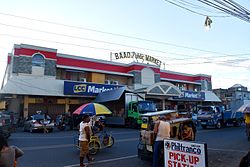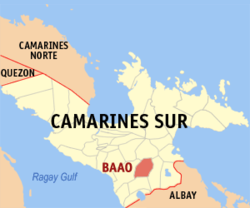Baao, Camarines Sur
| Baao | |
|---|---|
| Municipality | |
 |
|
 Map of Camarines Sur showing the location of Baao |
|
| Location within the Philippines | |
| Coordinates: 13°27′22″N 123°21′50″E / 13.4561°N 123.3639°ECoordinates: 13°27′22″N 123°21′50″E / 13.4561°N 123.3639°E | |
| Country | Philippines |
| Region | Bicol Region (Region V) |
| Province | Camarines Sur |
| District | 5th District |
| Founded | 1590 |
| Barangays | 30 |
| Government | |
| • Mayor | Melquiades I. Gaite (Lakas Kampi CMD) |
| Area | |
| • Total | 106.63 km2 (41.17 sq mi) |
| Population (2015 census) | |
| • Total | 58,849 |
| • Density | 550/km2 (1,400/sq mi) |
| Time zone | PST (UTC+8) |
| ZIP code | 4432 |
| IDD : area code | +63 (0)54 |
| Income class | 1st class, partially urban |
Baao, (Rinconada Bikol: Banwāan ka Baao; Tagalog: Bayan ng Baao) is a first class municipality in the province of Camarines Sur, Philippines. According to the 2015 census, it has a population of 58,849 people.
The municipality of Baao is within the 5th Congressional District of the province of Camarines Sur. The town is bounded on the north by the municipalities of Pili and Ocampo, on the east by the city of Iriga, on the west by Bula and south by the municipality Nabua. The town is approximately 480 kilometres (300 mi) south-east of Metro Manila, 30 kilometres (19 mi) south of Naga City, 7.5 kilometres (4.7 mi) west of Iriga City, and 70 kilometres (43 mi) north of Legazpi City.
Baao is politically subdivided into 30 barangays.
In the 2015 census, the population of Baao, Camarines Sur, was 58,849 people, with a density of 550 inhabitants per square kilometre or 1,400 inhabitants per square mile.
Rinconada Bikol is the main language of the population. Baaoeños used the Baao variant, a lowland dialect (sinaranəw) of Rinconada Bikol which is different of that in Iriga.
Tagalog and English are also spoken in formal gatherings and occasions. The latter is widely used in schools as well as in business transactions.
As one of the historical towns of Catholicism in the Bicol region, Baao has a majority of Roman Catholic adherents. Iglesia Ni Cristo on the other hand is the second largest group with a very fast phase of growing membership. Islam has already set off in the town and they are composed of Muslim merchants/immigrants from Mindanao. Various Protestants religions are also present.
...
Wikipedia

